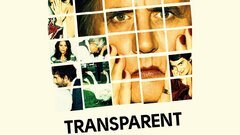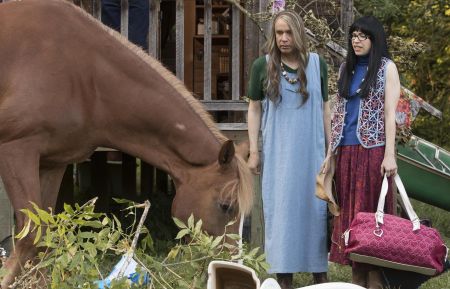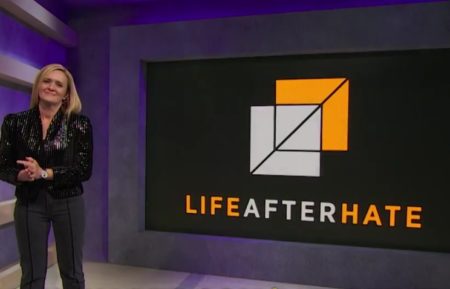No one would have ever guessed a 1990s "Riot grrrl" artist would turn into a veritable comedy star, yet Carrie Brownstein defied such expectations with her talent and creative genius. Brownstein made her mark in the mid-1990s with the Washington-based band Sleater-Kinney and its no-nonsense music, provocative lyrics, and feminist anthems.
Rooted in the "Riot grrrl" movement that launched bands such as Bikini Kill and inspired singers like Alanis Morissette, Sleater-Kinney impressed critics with its self-titled debut released in 1995. The group made strides toward mainstream attention with its post 9/11 album One Beat (2002) and a successful touring stint with Pearl Jam. After Sleater-Kinney announced an indefinite hiatus in 2006 (regrouping in early 2015), Brownstein discovered a passion for acting, which lead to a collaboration with "Saturday Night Live" (NBC, 1975- ) cast member Fred Armisen. Together, the duo created and starred on "Portlandia" (IFC, 2011- ), a hilarious and largely improvised sketch comedy series inspired by Portland's hipster-types, their idealistic world view, and obsession with 90s indie rock music. By marrying her love for music and acting on the hit TV show, Brownstein proved she was a gifted talent who could transcend not just genres but mediums. She expanded this new perception with a bestselling memoir, Hunger Makes Me A Modern Girl (2015), and a small role in Todd Haynes' drama "Carol" (2015).
Carrie Brownstein was born on Sept. 27, 1974, in Seattle, WA but raised in the nearby suburb of Redmond, the home of tech giants such as Microsoft and Nintendo of America. Brownstein began performing as a child, putting on plays she both starred in and created. When she was 14 years old, Brownstein's mother left the family, so it was up to her corporate lawyer father to take care of the future star and her younger sister. Years later, her father came out as a gay man and moved in with a younger partner, but he and Brownstein remained close.
As a teen who loved the music of the Clash, Brownstein used her savings from babysitting and working at a movie theater to buy a guitar. By the time she enrolled at Evergreen State College in Olympia, Brownstein was playing with a band called Excuse 17. Inspired by bands such as Bikini Kill, Heavens to Betsy, and Bratmobile, she became heavily involved in the "Riot grrrl" scene - an underground feminist and artistic movement with roots in the Pacific Northwest and influences that extended to pop music with Alanis Morissette and Courtney Love.
In the mid-1990s, Brownstein and former Heavens to Betsy member Corin Tucker, briefly dated and wrote songs together. After their respective groups disbanded, Brownstein and Tucker formed Sleater-Kinney, named after a freeway off-ramp in Olympia.
During a 1994 trip to Australia, Brownstein and Tucker stayed up all night during their last day and recorded what would become Sleater-Kinney's self-titled debut album. Released the following year, the album featured Brownstein and Tucker sharing vocal and guitar duties, and Lora Macfarlane on drums. The group drew from the "Riot grrrl" and punk rock sensibilities and transcended it to create something raw and unforgettable.
Sleater-Kinney became critical favorites with its follow-up albums Call the Doctor (1996) - featuring the single "I Wanna Be Your Joey Ramone" - and Dig Me Out (1997), recorded with new drummer Janet Weiss after Macfarlane had left the band in 1995. Named the best rock band in America by music critic Greil Marcus in 2001, Sleater-Kinney began catching more mainstream attention with One Beat, the group's socio-politically charged sixth album released as a response to the 9/11 terrorist attacks. The record reached No. 5 on the Billboard Top Independent Albums chart.
The band also won fans with its high-energy concerts, highlighted by Brownstein's signature sexy dance moves while playing guitar, which included a plum opening spot for Pearl Jam in 2003. Sleater-Kinney's 2005 release, the classic-rock inspired The Woods, would end up as its final album. The group announced an indefinite hiatus the following year without an explanation, although it was reportedly due to Tucker wanting to spend more time with her family.
After Sleater-Kinney parted ways, Brownstein branched out into other creative endeavors, from writing a music blog for National Public Radio, to working for Wieden+Kennedy, the advertising agency that created Nike's ubiquitous "Just Do It" campaign. Brownstein later revealed this period of her life was particularly difficult, to the point that she stopped playing guitar because it reminded her too much of the golden days of Sleater-Kinney. Instead, she became more involved with a small acting group in Portland, OR that she started with filmmaker friend Miranda July.
Brownstein also began collaborating with actor and musician Fred Armisen, who became a "Saturday Night Live" (NBC, 1975- ) cast member in 2002. Performing under the name ThunderAnt, the duo released a series of comedic sketches online in 2005, developing characters and scenarios based around Portland's hipster scene, often defined by its mid-twenties demographic, indie-rock music, neo-bohemian style, and DIY culture.
In 2009, Brownstein and Armisen pitched their Web sketches to the Independent Film Channel as well as "SNL" creator Lorne Michaels's production company; their pet project was quickly given the green light. "Portlandia" debuted on IFC two years later and starred Brownstein and Armisen as a variety of colorful characters who make up "Portlandia's" anti-mainstream, nostalgia-loving, politically correct community. The series also featured improvised sketches, musical numbers and guest stars such as Kyle MacLachlan (as the mayor of Portland), Gus Van Sant and Steve Buscemi.
"Portlandia" drew one of IFC's largest audiences and received critical praise, most notably from the city of Portland, whose real-life mayor Sam Adams appeared as MacLachlan's assistant. The show also helped to revive Brownstein's passion for music, including writing the theme song "Dream of the '90s." She also formed the post-punk, all-girl band Wild Flag, which released its self-titled debut in 2011.
While continuing to write and film "Portlandia," Brownstein next reformed Sleater-Kinney, releasing the comeback album No Cities To Love in early 2015. Later that year, she published the memoir Hunger Makes Me A Modern Girl and appeared in a supporting role in Todd Haynes' 1950s-set drama "Carol" (2015).
By Candy Cuenco






















































